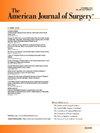Effectiveness of calcium channel blockers in traumatic brain injury patients requiring operative intervention
IF 2.7
3区 医学
Q1 SURGERY
引用次数: 0
Abstract
Introduction
In patients with traumatic brain injury (TBI), calcium channel blockers (CCBs) may be used in the early phase to manage hypertension. However, these medications may exacerbate secondary brain injury via hypotension and cerebral vasodilation, blunting Cushing's reflex. We hypothesized that preoperative CCB use does not improve outcomes.
Method
A retrospective study (2017–2023) at a Level 1 Trauma Center includes adults undergoing craniotomy or craniectomy within 6 h of arrival. Patients were grouped by CCB exposure. Outcomes included mortality, Glasgow Outcome Scale (GOS), ICU days, hospital length of stay, and discharge location.
Result
Of 105 patients, 33 received CCBs. Groups were similar in injury severity and initial GCS. Preoperative CCB was linked to significantly higher mortality (46.9 % vs. 23.3 %, p = 0.029) without significant GOS differences (p = 0.135). Other outcomes showed no significant differences.
Conclusion
Preoperative CCB use in TBI patients may be associated with higher mortality without improving outcomes.
钙通道阻滞剂在需要手术干预的外伤性脑损伤患者中的疗效。
在创伤性脑损伤(TBI)患者中,钙通道阻滞剂(CCBs)可在早期用于控制高血压。然而,这些药物可能通过低血压和脑血管舒张加剧继发性脑损伤,使库欣反射变钝。我们假设术前使用CCB不能改善预后。方法:在一级创伤中心进行回顾性研究(2017-2023),包括在到达后6小时内进行开颅手术或开颅手术的成年人。患者按CCB暴露程度分组。结局包括死亡率、格拉斯哥结局量表(GOS)、ICU天数、住院时间和出院地点。结果:105例患者中33例接受CCBs治疗。各组损伤严重程度和初始GCS相似。术前CCB与较高的死亡率相关(46.9% vs. 23.3%, p = 0.029), GOS无显著差异(p = 0.135)。其他结果无显著差异。结论:TBI患者术前使用CCB可能与较高的死亡率相关,但不能改善预后。
本文章由计算机程序翻译,如有差异,请以英文原文为准。
求助全文
约1分钟内获得全文
求助全文
来源期刊
CiteScore
5.00
自引率
6.70%
发文量
570
审稿时长
56 days
期刊介绍:
The American Journal of Surgery® is a peer-reviewed journal designed for the general surgeon who performs abdominal, cancer, vascular, head and neck, breast, colorectal, and other forms of surgery. AJS is the official journal of 7 major surgical societies* and publishes their official papers as well as independently submitted clinical studies, editorials, reviews, brief reports, correspondence and book reviews.

 求助内容:
求助内容: 应助结果提醒方式:
应助结果提醒方式:


